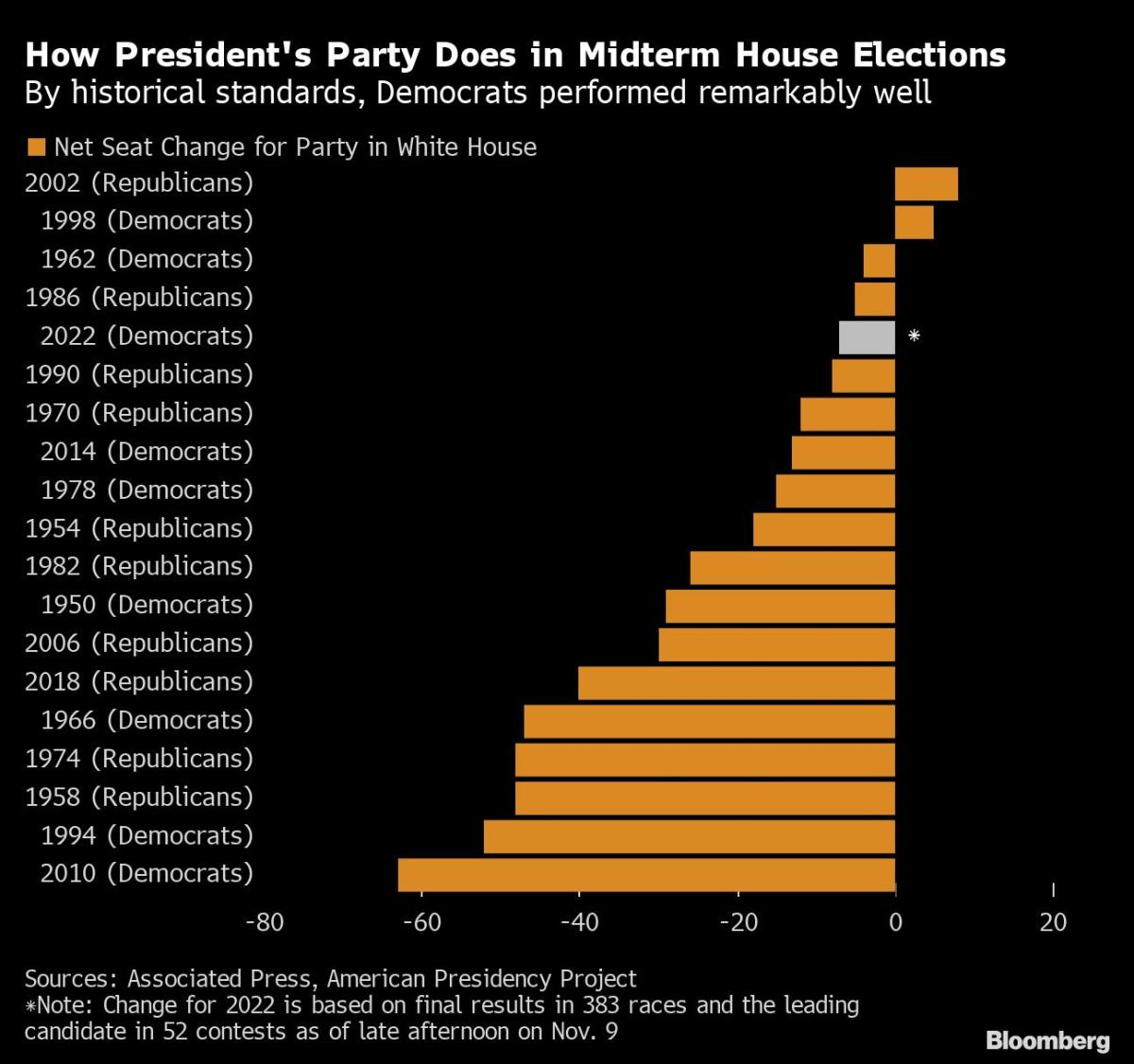
(Bloomberg) — Republicans won control of the US House by a far narrower margin than predicted following their failure to retake the Senate, a disappointing finish for a party that had counted on a decisive midterm election performance as groundwork for the 2024 presidential race.
Most Read from Bloomberg
More than a week after Election Day, the party finally gained the minimum 218 seats needed to control the chamber, the Associated Press reported Wednesday, when incumbent GOP Representative Mike Garcia defeated Democrat Christy Smith in California. Eleven races still remain undecided.
Despite concerns about President Joe Biden’s handling of the economy and the prospects of a recession, voters delivered a split verdict over who was to blame and how much weight to put on issues such as abortion rights and election deniers’ threats to democracy.
Biden, on his way back to Washington from the G-20 summit in Indonesia, said he would work with House Republican leader Kevin McCarthy. “I congratulate Leader McCarthy on Republicans winning the House majority, and am ready to work with House Republicans to deliver results for working families,” the president said in a statement.
McCarthy cheered the results, tweeting: “Republicans have officially flipped the People’s House! Americans are ready for a new direction, and House Republicans are ready to deliver.”
Slender as it is, the majority does give the GOP power over the House investigative committees with subpoena authority to investigate Biden’s Cabinet and his family as well as social-media companies that conservatives have claimed are biased against them.
Republicans also have promised to slash government spending, expand fossil fuel production and extend Trump-era tax cuts on the wealthy. Much of that agenda, however, will be left to wither in the Democratic-controlled Senate.
The GOP has spent the past week brooding over its poor showing in the midterm elections, with some Republicans blaming former President Donald Trump for losses in key races, not only in Congress but in statehouses as well.
But even as they chided him for promoting candidates that Democrats beat in Republican-favored races, the former president waded right back in to announce his third run for the White House.
Democrats Hold on To Senate
The Senate will remain in Democratic hands after John Fetterman flipped a once-Republican seat in Pennsylvania and incumbents Mark Kelly and Catherine Cortez Masto won re-election in Arizona and Nevada.
The Senate race in Georgia between Raphael Warnock, the Democratic incumbent, and Herschel Walker, the Republican, will be decided in a Dec. 6 runoff. But Fetterman’s win gave the Senate 50 seats, and therefore the majority.
Biden’s agenda will still be largely stalled by the GOP House, but their advantage was one of the smallest gained by either party in a midterm election in modern times.
The chair of the right-wing Freedom Caucus, Representative Scott Perry of Pennsylvania, suggested conservatives would use the election results to at least extract promises from McCarthy, including changes in the rules governing how the House is run.
“As a leader in the party, you have a duty to provide a vision that informs voters of what you’re going to do if you win,” Perry said. “I don’t think that vision was adequately provided by multiple folks on the top of our party.”
Since World War II, the party holding the White House has, on average, lost 26 House seats and four Senate seats. Barack Obama’s Democrats lost 63 House seats in 2010 and Trump’s Republicans 40 House seats in 2018.
The new GOP House majority was secured in part by victories in Democratic parts of New York State, where Representative Sean Patrick Maloney, the head of the Democratic campaign arm, lost a race for a Hudson Valley seat. An attempt by Democrats to gerrymander New York seats was rejected in court earlier in the year. Republicans also ousted Democratic incumbents in Florida, Iowa, Virginia, New Jersey to pick up seats.
Read More: Democrats Defy History, Keep Senate Control in Win for Biden
And Republican candidates who joined in Trump’s baseless claims of widespread voter fraud in 2020 and promised to take steps to ensure GOP wins in the future, were roundly defeated.
The election ends four years of Democratic control in the House, which saw passage of the largest infrastructure and climate change bills in history, a massive coronavirus stimulus program, an overhaul of the Medicare drug benefit and an historic investment in US semiconductor manufacturing.
Republicans expected voters to punish Democrats with a lost of 60 or more seats as inflation hit 40-year highs and gasoline prices soared. But in the end, just a few Democratic incumbents lost their reelection bids.
The midterm result could spell the end of House Speaker Nancy Pelosi’s run as the Democratic Party’s leader in the House, where a new generation of leaders is eager to ascend.
For businesses, the return of Republicans to control of the House takes the possibility of corporate tax increases favored by Democrats off the table while diminishing the changes of workforce-boosting reforms to legal immigration. But markets may be turbulent in the middle of next year if Republicans carry through on threats to hold the nation’s debt ceiling hostage to force Biden to accept spending cuts.
(Updates with details throughout)
Most Read from Bloomberg Businessweek
©2022 Bloomberg L.P.




